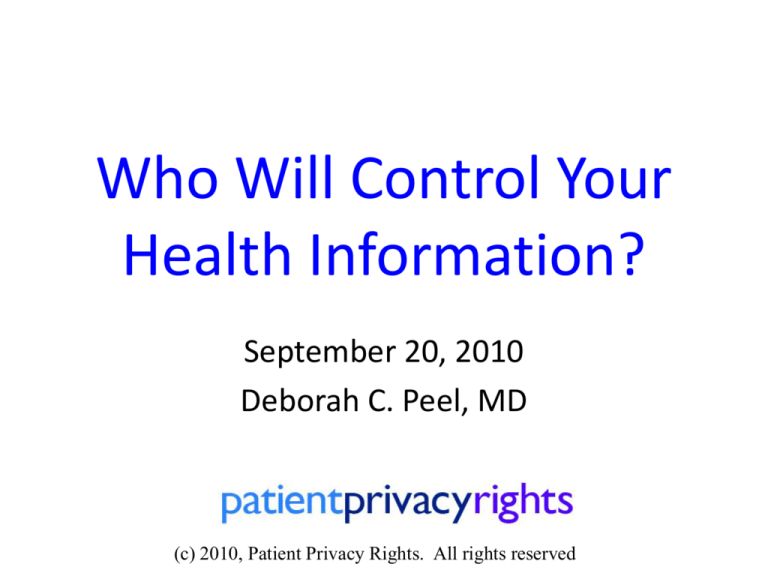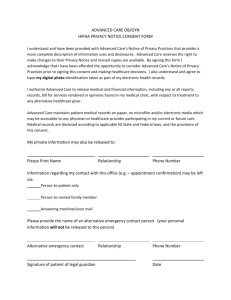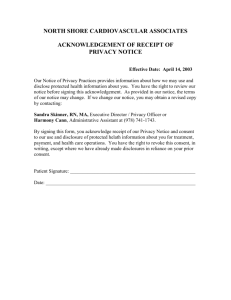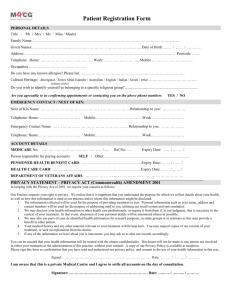
Who Will Control Your
Health Information?
September 20, 2010
Deborah C. Peel, MD
(c) 2010, Patient Privacy Rights. All rights reserved
What’s in play TODAY
• vast secret health data mining
industry
• patients cannot control personal
health information
• Modifications to HIPAA--Will this
help or harm us?
• Texas will spend $27.8 M on HIE
Americans expect
privacy and security,
but….
huge market for health data
+
theft and sale of health data
→
health data mining industry
Where did this slide come from ? The Medical Information Bureau website. The MBI
sells claims/health data to insurers and employers.
35% of Fortune 500
companies admit to using
medical records for hiring and
promotions
65 Fed. Reg. 82,467
Wal-Mart Memo Suggests Ways to Cut Employee Benefit Costs
“Redesign benefits and other aspects of the Associate experience, such as job
design, to attract a healthier, more productive workforce.”
“The team is also considering additional initiatives to support this objective, including: all
jobs to include some physical activity (e.g., all cashiers do some cart gathering).” October
26, 2005
2010: Top Fortune 500 Companies
health data mining industry
4 General Electric (GE Centricity EHR/HIT systems,
sells clinical data) revenue 157B
14 McKesson (sells Rx data) revenue 107B
18 CVS Caremark (sells Rx data) revenue 99B
21 UnitedHealth Group (sells RX data thru
Ingenix subsidiary) revenue 87B
31 WellPoint (sells claims/clinical data via BHI)
revenue 65B
http://money.cnn.com/magazines/fortune/fortune500/2010/full_list/
2010: Top Fortune 500
Health Care: Pharmacy and Other
Services (health data mining industry)
Rank Company/500 rank
Revenues($ billions)
1 Medco Health Solutions #35 59.8 (sells Rx data)
2 HCA (largest US hospital chain) #77
30
(?? sells hospital and Rx data)
3 Express Scripts #96
25
(sells Rx data)
4 Quest Diagnostics #303
7
(sells data/sends data to HIEs)
“transforms millions of test results into valuable information products”
http://www.questdiagnostics.com/brand/careers/index.html#services
5 Omnicare #347
6.3
(???)
(leading Rx provider for seniors)“we capture a tremendous amount of data”
..combines data with outcomes algorithm technology
6 Lab Corp. of America #442
4.7 (sells data??/sends data to HIEs)
EHRs, PHRs, claims data,
lab data, prescriptions,
health searches, etc
PrimeResearch part of an
EHR/Practice Management Suite
Key Benefits for Physicians:
“Make clinical research GREENWAY HELPS
participation a revenue PHYSICIANS SELL:
source” • “de-identified” clinical data
• “de-identified” financial data
ie, doctors sell access
• population data
to their patients and
• data on 19 M patients
• 8 million prescriptions/yr
patients’ records
• data on 8,000 providers
http://www.greenwaymedical.com/solutionprime-research/
The result – increased practice revenues and access to
Athenahealth Paying Dearly to Take
on Larger Rivals by Ryan McBride 5/6/10
athenahealth strives to be
the best at getting doctors
paid
used by 19,500 physicians
and medical providers
nationwide
http://www.athenahealth.com/strategic-alliances/
index.phphttp://www.athenahealth.com/strategicalliances/index.php
Athena might be able to halve the amount
that physicians pay to use its EHR if they
participate in “AthenaCommunity.”
Athena’s EHR customers who opt to share
their patients’ data with other providers
would pay a discounted rate to use
Athena’s health record software.
Athena would be able to make money with
the patient data by charging, say, a hospital
a small fee to access a patient’s insurance
and medical information from Athena’s
network.
http://www.xconomy.com/boston/2010/05/06/
athenahealth-paying-dearly to-take-on-largerrivals/3/
By Diana Manos, Senior Editor
12/31/07
Practice Fusion expands, shows signs of
rapid growth
Practice Fusion subsidizes its free EMRs by
selling de-identified data to insurance groups,
clinical researchers and pharmaceutical
companies.
Howard said he does not expect data-sharing
will be a concern to physicians who use Practice
Fusion's EMRs. “Every healthcare vendor is
selling data.”
What is BHI® (Blue Health Intelligence)?
shares critical health information with employers
premier health intelligence resource
BHI sets the new standard for healthcare data aggregation, reporting and analysis
Size and Value of data for sale
1) longitudinal data on 54 million BCBS members [without consent]
2) reporting not only by MSA, industry and product type, but by Diagnosis Related Groups
(DRGs) code, age group and gender [allows re-identification]
How does BHI ensure the privacy and security of members’
healthcare information?
1) adheres to HIPAA regs = no consent for use and sale of data
2) Use a system-generated identifier, allowing longitudinal analysis [allows re-identification]
3) fully de-identified in accordance with HIPAA [17 identifiers removed, still allows reidentification of .04%]
http://www.bcbs.com/innovations/bhi/bhi-faqs-1-12-09.pdf
Medicare and Medicaid data for sale
“at the patient level”
Businessweek July 23, 2008: “They Know What's in Your Medicine Cabinet,
How insurance companies dig up applicants' prescriptions—and use them to deny
coverage" http://www.businessweek.com/magazine/content/08_31/b4094000643943.htm?chan=magazine+channel_in+depth
wait….it gets worse
health IT security is
ABYSMAL
security
breaches
weak security → breaches
• easy to hack
• weak authentication
• weak ‘role-based’ authorization → ‘insider’
snooping and theft
• data at rest, in use, in transit not encrypted
• P2P software leaks data
• web apps (SaaS/SSL) leak data*
• ease of copying, stealing, losing mobile devices
• de-identification and anonymization don’t work
• unsafe clouds
* http://www.informatics.indiana.edu/xw7/WebAppSideChannel-final.pdf
?????
?
?
?
?
?
Fawcett's
cancer file
breached
The incident occurred
months before UCLA
hospital employees were
caught snooping in Britney
Spears' files.
By Charles Ornstein
April 3, 2008
Cost of Security Breaches
EXAMPLE: In 2006, Providence Health & Services paid a $95,000 penalty and provided
two years of free credit monitoring to thousands of people after a car prowler broke
into the van of a Providence employee who had left computer disks and data tapes
inside. The records, some going back 20 years, contained Social Security numbers and
medical information for 365,000 people. Providence spent $8-9M defending against a
class action lawsuit.
•
•
•
Average direct, indirect, and opportunity costs to companies that experienced a data
breach was $14 million/company.
average cost: $140/customer with breached data
100,000 is the average number of customers affected by security breaches
Laptop Data Breaches: Mitigating Risks Through Encryption and Liability Insurance
By Julie Machal-Fulks and Robert J. Scott,
http://www.scottandscottllp.com/main/uploadedFiles/resources/Articles/ArticleLaptop_Data_Breach
es.pdf
By Pamela Lewis Dolan, amednews staff. Posted May 4, 2010.
Most health care information leaks have involved
electronic systems, but some were paper-based.
HHS "started listing the breaches on its website in February”
• 1,243,815 individuals were affected
Data indicate that "of the 64 breaches...7 involved laptops, 12
involved paper records, 11 involved desktop computers, 8
involved either hard drives or network services, and 7 involved
portable electronic devices."
2009 Data Breaches –
Paper vs. Electronic Summary
Totals for Electronic records:
# of Breaches: 369
# of Records: 222,286,837
# of Health records: 11,279,390
% of Breaches: 74.1
% of Records: 99.9
Totals for Paper records:
# of Breaches: 129
# of Records: 190,206
% of Breaches: 25.9
% of Records: .01
BUT in more than 52% of the breaches publicly reported, NO statement
of the number of records exposed is given. Therefore, it is unknown how
many total records may have been exposed due to breaches in 2009.
2009 - type of breach
2,532,674+
21,780+
8,501,878+
3,317+
13,871+
245,698+
Data on the Move
Subcontractors
Hacking
Accidental Exposure
Insider Theft
Unknown Attributes (type not reported)
Identity Theft Resource Center
http://www.idtheftcenter.org/index.html
The Wall Street Journal
Are Your Medical Records at Risk?
Amid Spate of Security Lapses, Health-Care Industry Weighs Privacy
Against Quality Care
By SARAH RUBENSTEIN
April 29, 2008; Page D1
Breaches of consumers' confidential
data are widespread in the health-care
industry.
But hospitals are notable for the sheer number and types of
employees – including billing staff, nurses, doctors, researchers and lab
technicians -- who have quick access to individuals' private
information.
http://online.wsj.com/article/SB120941048217350433.html?mod=loomia&loomia_si=t0:a16:
g2:r2:c0.156457
Electronic medical records at risk of
being hacked, report warns
CIO news
By Linda Tucci, Senior News Writer
19 Sep 2007 | SearchCIO.com
"There was not one system we could not penetrate and
gain control of data, said Daniel S. Nutkis. These systems
were not any worse than banking systems. But the
banking systems have elaborate security mechanisms
sitting on top of them."
The eHVRP report is based on a 15-month study of more than 850
provider organizations.
http://searchcio.techtarget.com/originalContent/0,289142,sid182_gci1273006,00.html
Americans expect
privacy and control
but….
HIPAA was gutted
in 2002
HIPAA regs eliminated consent and privacy
1996
2001
2002
Congress passed HIPAA, but did not
pass a federal medical privacy
statute, so the Dept. of Health and
Human Services (HHS) was required
to develop regulations that
specified patients’ rights to health
privacy. Public Law 104-191
“… the Secretary of Health and Human Services shall
submit to [Congress]…detailed recommendations on
standards with respect to the privacy of individually
identifiable health information.”
President Bush implemented
the HIPAA “Privacy Rule” which
recognized the “right of consent”.
HHS wrote these regulations.
65 Fed. Reg. 82,462
“….a covered health care provider must obtain the
individual’s consent, in accordance with this section,
prior to using or disclosing protected health information
to carry out treatment, payment, or health care
operations.”
HHS amended the HIPAA
“Privacy Rule”, eliminating the
right of consent.
“The consent provisions…are replaced with a new
provision…that provides regulatory permission for
covered entities to use and disclose protected health
information for treatment, payment, healthcare
operations.”
67 Fed. Reg. 53,183
privacy ≠ security
Privacy = how many keys?
Security
What does ‘privacy’ mean?
The NCVHS defined health information privacy as
“an individual’s right to control
the acquisition, uses, or
disclosures of his or her
identifiable health data”.
(June 2006, NCVHS Report to Sec. Leavitt, definition originally from the IOM)
privacy = control
patients’ rights &
expectations
10 Million Americans Expect
Privacy and Security
The bipartisan Coalition for Patient Privacy, 2010
AIDS Action
American Association of People with Disabilities
American Association of Practicing Psychiatrists
American Chiropractic Association
American Civil Liberties Union
American Conservative Union
American Psychoanalytic Association
Association of American Physicians and Surgeons
Bazelon Center for Mental Health Law
Bob Barr (former Congressman R-GA)
Citizens for Health
Citizen Outreach Project
Clinical Social Work Association
Consumer Action
Consumers for Health Care Choices
Cyber Privacy Project
Doctors for Open Government
Ethics in Government Group
Fairfax County Privacy Council
Family Research Council
Free Congress Foundation
Georgians for Open Government
Gun Owners of America
Health Administration Responsibility Project, Inc.
Just Health
Multiracial Activist
Microsoft Corporation Inc.
National Center for Transgender Equality
The National Center for Mental Health Prof. & Consumers
National Whistleblower Center
National Workrights Institute
Natural Solutions Foundation
New Grady Coalition
Pain Relief Network
Patient Privacy Rights Foundation
Privacy Activism
Privacy Rights Now Coalition
Private Citizen, Inc.
Republican Liberty Caucus
Student Health Integrity Project
TexPIRG
Thoughtful House Center for Autism
Tolven, Inc.
Tradition, Family, Property, Inc.
Universata, Inc.
U.S. Bill of Rights Foundation
You Take Control, Inc.
AHRQ: 2009
20 focus groups expect control
• A majority want to “own” their health data, and
to decide what goes into and who has access to
their medical records. (AHRQ p. 6)
• A majority believe their medical data is “no one
else’s business” and should not be shared
without their permission….not about sensitive
data but “a matter of principle”. (AHRQ p. 18)
AHRQ: 2009
20 focus groups expect control
• no support for general rules that apply to all
consumers
• consumers should exert
control over their own health
information individually,
rather than collectively. (AHRQ p. 29)
AHRQ Publication No. 09-0081-EF “Final Report: Consumer Engagement in
Developing Electronic Health Information Systems” Prepared by: Westat,
(July 2009)
http://healthit.ahrq.gov/portal/server.pt/gateway/PTARGS_0_1248_888520_0_0_18/09-0081-EF.pdf
2006 Privacy and EHR Systems:
Can We Avoid A Looming Conflict?
42% of public feels potential privacy
risks outweigh potential EHR benefits
60% of public wants to know EHR
impacts and the right to choose how
records used
Dr. Alan F. Westin
Professor of Public Law and
Government Emeritus, Columbia University
Markle Conference on “Connecting
Americans to Their Health Care,”
Washington, D.C. Dec 7-8, 2006
2009 NPR/Kaiser/Harvard Poll
The Public and the Health Care Delivery System
59% are NOT confident online medical
records will remain confidential
76% believe unauthorized persons will
access their online medical records
http://www.kff.org/kaiserpolls/upload/7888.pdf
no support for
research without
consent
Westin/Harris Survey for the
Institute of Medicine
Results of a National Survey
Commissioned by the IOM Committee on
“Health Research and the Privacy of
Health Information: The HIPAA Privacy Rule”
Original Report - November 2007; Revised and
expanded - March 2008
IOM Survey: People Won’t Participate
in Research Without Privacy
• Only 1% agreed that researchers would be free to use
personal medical and health information without
consent
• Only 19% agreed that personal medical and
health information could be used as long as
the study “never revealed my personal identity”
and it was supervised by an Institutional Review
Board.
http://patientprivacyrights.org/media/WestinIOMSrvyRept.pdf?docID=2501
research on consent for use
of newborn bloodspots
From Public Health Genomics
When Asked, Consumers Support Use of Their Data
"How willing are you to have your child's blood sample (from newborn
screening) used for future research studies, with (or without) your
permission?”
Four choices were:
• Very willing
• Somewhat willing
• Somewhat unwilling
• Very unwilling
Source: Dr. Aaron Goldenberg (Case Western
Reserve), Public Health Genomics, July 9, 2009 (as
reported at Genetic Alliance Conference on
Newborn Screening, December 2009).
Over 75% would
share their data!
When Asked, Consumers Support Use of Their Data
"How willing are you to have your child's blood sample (from newborn
screening) used for future research studies, with (or without) your
permission?”
WITHOUT CONSENT Only 28% were OK with research
use
and 72% were NOT OK with research
Four choices were:
• Very willing
• Somewhat willing
• Somewhat unwilling
• Very unwilling
Source: Dr. Aaron Goldenberg (Case Western
Reserve), Public Health Genomics, July 9, 2009
(as reported at Genetic Alliance Conference on
Newborn Screening, December 2009).
Over 75% would
share their data!
Americans expect
privacy and security,
but….
REALITY:
rampant data theft and
a massive data mining
industry thrives, while
doctors and patients
can’t access PHI
Anonymous data isn’t
“… a common practice is for organizations to
release and receive person specific data with all
explicit identifiers, such as name, address and
telephone number, removed ….because the
resulting data look anonymous.
However,… the remaining data can be used to
re-identify individuals by linking or matching
the data to other data ..”*
Latanya Sweeney, PhD, Director, Laboratory for International Data
Privacy, School of Computer Science, Carnegie Mellon University
*k-anonymity: a model for protecting privacy. International Journal on Uncertainty,
Fuzziness and Knowledge-based Systems, 10 (5), 2002; 557-570.
Anonymous data isn’t
“We must respond to the surprising failure of
anonymization”
“Anonymization, [is] the name for techniques for
protecting the privacy of individuals in large
databases by deleting information like names and
social security numbers”
“Scientists have demonstrated they can often
“reidentify” or “deanonymize” individuals hidden
in anonymized data with astonishing ease”*
Paul Ohm, Associate Professor, University of Colorado Law School
* Broken promises of Privacy: Responding to the Surprising Failure of Anonymization,
VER. 0.99 SSRN: 8/14/2009:
http://papers.ssrn.com/sol3/papers.cfm?abstract_id=1450006&rec=1&srcabs=1446862
HITECH:
historic new consumer
protections, but…
ARRA—new privacy rights and MU
Old rights under HIPAA:
• Providers may offer consent (Original HIPAA Privacy Rule), so
patients can restrict disclosures---not addressed in MU
• Psychotherapy Notes require consent to disclose---not addressed
in MU
New rights under ARRA:
• Ban on sales of PHI (Protected Health Information)---2010
(waiting for comments on NPR and final rule)
• Segmentation---delayed
• Audit trails x 3 years---2011 or later
• Breach notice---2010 ( added “harm” standard violates HITECH!)
• Encryption---2010 but industry is not doing this
• Patient can prevent disclosures of PHI for ‘payment and
healthcare operations’ if pays out-of-pocket---not addressed
• Consent Technologies---2014 or later
“Meaningful Use”
isn’t meaningful to
patients
Latanya Sweeney on flaws in MU EHR
criteria and NHIN/HIEs
Secondary use of PHI by Business Associates is
“unbounded, widespread, hidden, and difficult
to trace.”
Implementing MU EHRs will “increase data sharing,
but adding the NHIN will massively increase data
sharing.”
The two proposed NHIN models to link all Americans' health
information online do not offer “utility or privacy”.
http://patientprivacyrights.org/wp-content/uploads/2010/04/Sweeney-CongressTestimony-4-22-10.pdf
Sweeney on designing privacy in HIT
Observation: "Scott McNealy, the CEO of Sun Microsystems,
famously quipped, "Privacy is dead. Get over it."
Sweeney's response: "Oh privacy is definitely not dead. When
people say you have to choose, it means they haven't actually
thought the problem through or they aren't willing to accept
the answer.
… he very much shares that attitude of the computer scientist
who built the technology that's invasive; who says, "Well, you
want the benefits of my technology, you'll get over privacy".
It's exactly the kind of computer scientist we don't want to be
graduating in the future.”
http://patientprivacyrights.org/2007/06/privacy-isnt-dead-or-at-least-it-shouldntbe-a-qa-with-latanya sweeney
MU EHR flaws
• data mining for many uses without informed consent
• “unbounded uses” by CEs and BAs—no trust without verification
NHIN/RHIO/HIE/HIO flaws
•
•
•
•
•
allow broad “stakeholder” (insurers, employers) access to data
patients don’t want “stakeholder” access, they want control
impossible to share data selectively (segment sensitive records)
illegal, blanket consents = impossible to share data 1-to-1
labs and Rx data industry will dump 1,000s of “batched” test
reports and prescriptions into HIOs—patients’ privacy will be violated
even if they opt-out
• without segmentation, HIE/NHIN can’t exchange data across state lines
with states---all states require consent for sensitive data (segmentation)
• without segmentation can’t put teens’ data, genetic data, STDs, mental
health, addiction data into HIT systems
Health IT and HIE: 2 separate worlds
Corporations, Govt, & some
Doctors
• Industry-centered system
• LOTS of Data = commodity = $$$$
• massive data flows and 2ndary use of
sensitive personal data
• Data theft, no consent
• Robust HIT systems
– One hospital = 200+ HIT systems
•
•
•
•
•
Robust HIE
Vendors and users sell data
Data flows outside US
Massive security flaws
“Wild West”-- data mining for profit
and discrimination
• Unfair and deceptive trade practices
Patients, Family, & some Doctors:
•
•
•
•
•
•
•
•
•
•
•
•
•
•
Not “patient-centered”
Hardly any data
Limited control over PHI
Limited access to PHI
Limited benefits from HIT
Limited HIE
Massive harms/risks from HIT/HIE
Limited recourse from harms
Can’t restore data privacy = no way
to “make whole” or repair exposure
Generations of discrimination
Secret health data bases
No transparency/accountability
No privacy and weak security
Patient Safety—EHRs can harm, be
source of errors, can’t delete/amend
Will we finally get
meaningful and
comprehensive
privacy and security?
Consumer Choices
Technology Hearing
7 privacy-enhancing technologies
‘live’ demonstrations
Washington DC, June 29, 2010
video: http://nmr.rampard.com/hit/20100629/default.html
transcript and written testimony:
http://healthit.hhs.gov/portal/server.pt?open=512&mode=2&objID=2833
&PageID=19477#062910
federal privacy precedents
• TITLE 38 - PART V , CHAPTER 73 SUBCHAPTER III - PROTECTION OF
PATIENTRIGHTS
§ 7332. (a) (1) Confidentiality of certain medical
records: drug abuse, alcoholism or alcohol abuse, HIV,
sickle cell anemia
• 42 CFR Part 2
alcohol and substance abuse
July 8, 2010 New Privacy Policy:
Sec. Sebelius: "Administration-wide commitment to
make sure no one has access to your personal
information unless you want them to”.
Dr. Blumenthal: "we want to make sure it is possible for
patients to have maximal control over PHI."
See: http://patientprivacyrights.org/2010/07/ppr-impressed-with-hhsprivacy-approach/
Patient-centered HIT systems
1. universal online consent tools--benefits
• dynamic, not static
• fine-grained decisions, like online banking "Bill Pay"
-automatic rules (like monthly payments), or case-by-case
• ability to share selectively (in accord with laws, rights,
expectations)
• no need to update consents in many locations
• no need for MPI or single patient ID
• independent audit trails of all uses and disclosures
via use of authentication and authorization systems
(employees have unique access codes and can see selected data)
(c) 2007-2010, Private Access, Inc. All rights reserved. (Reprinted with permission).
Patient-centered HIT system
2. health banks--benefits
• ironclad security and architecture
• today there is no place w/ a complete and accurate
copy of our health records
• patients control access and use of PHI
• only patients can collect complete and accurate PHI
• ‘safer’ research, less risk of exposing data
• like census bureau: run research queries on individual data
• unlike census bureau, no research without consent
• sensitive data is NOT released
• no need for MPI or UPIN (single ID)---patients have
separate ID at each location = better privacy protections
(stolen data has less value)
Patient-centered HIT systems
3. other systems--benefits
• decentralized consents with centralized control. In this
situation, patients can make local data sharing decisions
at the time and place of service, but have a universal
portal to update or change consents as needed
•
an NHIN that works likes a filing cabinet. In this
situation, all patient information goes to a common
location, and the patient can make decisions about
sharing at that storage location
texas
Texas Health Services Authority
•
•
•
•
•
Legislature created in 2007 (HB 1066)
public-private partnership
GOAL: promote and coordinate HIE statewide
nonprofit
board appointed by Governor w/advice and consent of
Senate
• board appointed 2008, met 2008-2009 to evaluate
opportunities –but no funds
• American Recovery and Reinvestment Act (ARRA)
changed EVERYTHING
• Now THSA has $38 M to “wire” health data exchanges
who is going to
exchange our health
data?
How good are Texas HIEs?
Sufficiency of funding stream for:
• Current operations: 12 yes; 10
no (three did not respond)
• Planned operations: 7 yes; 14 no
(four did not repond)
Time Frame to expand
data exchanges
Pay Attention
they think they will do this by 2013!
Consent
Budget
TOTAL BUDGET: $27.8 Million dollars to
open access to OUR health information!
what can we do?
act now
• sign Do Not Disclose petition
• take YOUR consent to providers
Go to
www.patientprivacyrights.org
spread the
word!
Deborah C. Peel, MD
Founder and Chair
(O) 512-732-0033
dpeelmd@patientprivacyrights.org
www.patientprivacyrights.org
Key References:
EHRs “Your Medical Records Aren't Secure” by Deborah C. Peel in the WSJ, March 23, 2010
http://online.wsj.com/article/SB10001424052748703580904575132111888664060.html
PHRs “Who can snoop in your PHR? A Personal Health Record Report Card
http://patientprivacyrights.org/personal-health-records/
HIEs and NHIN “Designing a Trustworthy Nationwide Health Information Network (NHIN)
Promises Americans Privacy and Utility, Rather than Falsely Choosing Between Privacy or
Utility” by Latanya Sweeney, PhD, April 22, 2010, Congressional Briefing on the
“Implementation of Health Information Technologies in a Healthcare Environment”
http://patientprivacyrights.org/wpcontent/uploads/2101/04/SweeneyCongressTestimony-4-2210.pdf
See NHIN slides at:
http://patientprivacyrights.org/wpcontent/uploads/2010/06/SweeneyTrustworthyNHINDesigns.pdf
Research “Improve Privacy in Research by Eliminating Informed Consent?” IOM Report
Misses the Mark. In The Journal of Law, Medicine & Ethics, Volume 37, Issue 3 (p 507-512)
by Mark A. Rothstein.
http://patientprivacyrights.org/wpcontent/uploads/2010/02/Rothstein-ReIOM-Report.pdf
P2P leaks “Data Hemorrhages in the Health-Care Sector”, in Financial Cryptography and
Data Security, February 22-25, 2009 by M. Eric Johnson
http://patientprivacyrights.org/media/JohnsonHemorrhagesFC09d.pdf
Key References:
Patient-centric health care: “What Patient-Centered Should Mean: Confessions of An
Extremist” by Donald M. Berwick, May 19, 2009 See:
http://patientprivacyrights.org/library/ scroll down to More
Coalition for Patient Privacy: Comments of NPRM (changes to HIPAA) See:
http://patientprivacyrights.org/2010/09/coalition-urges-hhs-to-restore-patient-controlover-access-to-health-data-now/







